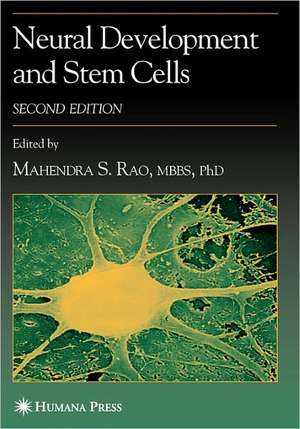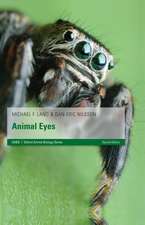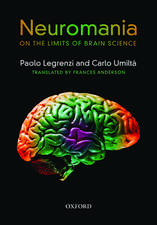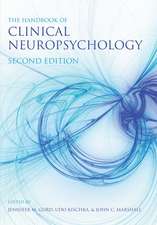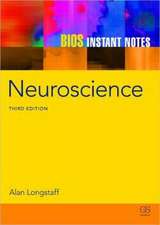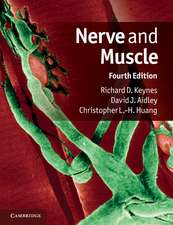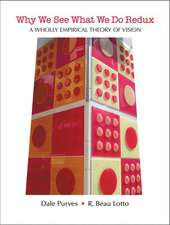Neural Development and Stem Cells: Contemporary Neuroscience
Editat de Mahendra S. Rao, Mohan C. Vemuri, Melissa Carpenteren Limba Engleză Paperback – 9 dec 2010
| Toate formatele și edițiile | Preț | Express |
|---|---|---|
| Paperback (1) | 1220.75 lei 6-8 săpt. | |
| Springer – 17 iul 2014 | 1220.75 lei 6-8 săpt. | |
| Hardback (1) | 1225.16 lei 6-8 săpt. | |
| Springer – 6 iun 2012 | 1225.16 lei 6-8 săpt. |
Din seria Contemporary Neuroscience
- 5%
 Preț: 1128.63 lei
Preț: 1128.63 lei - 18%
 Preț: 965.52 lei
Preț: 965.52 lei - 5%
 Preț: 1108.35 lei
Preț: 1108.35 lei - 18%
 Preț: 1228.15 lei
Preț: 1228.15 lei - 18%
 Preț: 1229.73 lei
Preț: 1229.73 lei - 18%
 Preț: 1231.64 lei
Preț: 1231.64 lei - 18%
 Preț: 945.47 lei
Preț: 945.47 lei - 18%
 Preț: 1244.08 lei
Preț: 1244.08 lei - 15%
 Preț: 638.76 lei
Preț: 638.76 lei - 18%
 Preț: 1240.47 lei
Preț: 1240.47 lei - 18%
 Preț: 1385.99 lei
Preț: 1385.99 lei - 18%
 Preț: 1227.84 lei
Preț: 1227.84 lei - 18%
 Preț: 1220.88 lei
Preț: 1220.88 lei - 18%
 Preț: 961.55 lei
Preț: 961.55 lei - 15%
 Preț: 695.70 lei
Preț: 695.70 lei - 18%
 Preț: 959.82 lei
Preț: 959.82 lei - 5%
 Preț: 1112.17 lei
Preț: 1112.17 lei - 18%
 Preț: 1233.83 lei
Preț: 1233.83 lei - 18%
 Preț: 950.96 lei
Preț: 950.96 lei - 24%
 Preț: 799.51 lei
Preț: 799.51 lei - 18%
 Preț: 954.77 lei
Preț: 954.77 lei - 18%
 Preț: 1227.21 lei
Preț: 1227.21 lei - 5%
 Preț: 1117.46 lei
Preț: 1117.46 lei - 18%
 Preț: 1248.02 lei
Preț: 1248.02 lei - 18%
 Preț: 949.10 lei
Preț: 949.10 lei - 5%
 Preț: 1114.35 lei
Preț: 1114.35 lei - 15%
 Preț: 694.22 lei
Preț: 694.22 lei - 18%
 Preț: 950.52 lei
Preț: 950.52 lei - 5%
 Preț: 1124.07 lei
Preț: 1124.07 lei - 5%
 Preț: 1117.10 lei
Preț: 1117.10 lei - 24%
 Preț: 1089.45 lei
Preț: 1089.45 lei - 18%
 Preț: 1227.52 lei
Preț: 1227.52 lei - 18%
 Preț: 955.08 lei
Preț: 955.08 lei - 5%
 Preț: 1417.38 lei
Preț: 1417.38 lei
Preț: 637.13 lei
Preț vechi: 700.14 lei
-9% Nou
Puncte Express: 956
Preț estimativ în valută:
121.93€ • 132.40$ • 102.42£
121.93€ • 132.40$ • 102.42£
Carte indisponibilă temporar
Doresc să fiu notificat când acest titlu va fi disponibil:
Se trimite...
Preluare comenzi: 021 569.72.76
Specificații
ISBN-13: 9781617375934
ISBN-10: 1617375934
Pagini: 464
Ilustrații: 468 p. 84 illus.
Dimensiuni: 178 x 254 x 24 mm
Greutate: 0.87 kg
Ediția:Softcover reprint of hardcover 2nd ed. 2006
Editura: Humana Press Inc.
Colecția Humana
Seria Contemporary Neuroscience
Locul publicării:Totowa, NJ, United States
ISBN-10: 1617375934
Pagini: 464
Ilustrații: 468 p. 84 illus.
Dimensiuni: 178 x 254 x 24 mm
Greutate: 0.87 kg
Ediția:Softcover reprint of hardcover 2nd ed. 2006
Editura: Humana Press Inc.
Colecția Humana
Seria Contemporary Neuroscience
Locul publicării:Totowa, NJ, United States
Public țintă
ResearchCuprins
Defining Neural Stem Cells and Their Role in Normal Development of the Nervous System.- Neural Stem Cells in the Adult Brain.- Cellular and Molecular Properties of Multipotent Neural Stem Cells Throughout Ontogeny.- Multipotent Stem Cells in the Embryonic Nervous System.- Regulation of Neural Stem Cell Death.- Neuronal Progenitor Cells of the Mammalian Neonatal Anterior Subventricular Zone.- Glial Restricted Precursors.- PNS Precursor Cells in Development and Cancer.- Stem Cells of the Adult Olfactory Epithelium.- Retinal Stem Cells.- Transdifferentiation in the Nervous System.- Neural Progenitor Cells of the Adult Human Brain.- Embryonic Stem Cells and Neurogenesis.- Mobilization of Neural Precursors in the Adult Central Nervous System.- Neural Stem Cells and Transplant Therapy.
Caracteristici
Includes supplementary material: sn.pub/extras
Recenzii
Notă biografică
Mahendra S. Rao, MD, Ph.D
Dr. Rao is internationally renowned for his research involving human embryonic stem cells (hESCs) and other somatic stem cells. He has worked in the stem cell field for more than 20 years, with stints in academia, government and regulatory affairs and industry. He received his M.D. from Bombay University in India and his Ph.D. in developmental neurobiology from the California Institute of Technology, Pasadena. Following postdoctoral training at Case Western Reserve University, Cleveland, he established his research laboratory in neural development at the University of Utah, Salt Lake City. He next joined the National Institute on Aging as chief of the Neurosciences Section, where he studied neural progenitor cells and continued to explore his longstanding interest in their clinical potential. He then spent six years as the vice president of Regenerative Medicine at Life Technologies, Carlsbad, Calif. Most recently, he returned in August 2011 tothe National Institutes of Health (NIH), as Director of the new NIH Center for Regenerative Medicine (NIH CRM). He co-founded Q Therapeutics, a neural stem cell company based in Salt Lake City. He also served internationally on advisory boards for companies involved in stem cell processing and therapy, on committees including the U.S. Food and Drug Administration’s Cellular Tissue and Gene Therapies Advisory Committee chair, and as the California Institute of Regenerative Medicine and International Society for Stem Cell Research liaison to the International Society for Cellular Therapy.
Melissa Carpenter, Ph. D.
For the last 17 years, Dr. Carpenter has worked on the development of cell therapies using human adult and embryonic stem cells, in academia and industry, in the United States and Canada. She has been involved with human embryonic stem cell (hESC) research since the field was established. Her work involves discovery research and the translation ofthis research into therapeutics, including developing strategies for preclinical development and navigating the regulatory issues surrounding stem cell therapies. She has held leadership positions at 3 of the major stem cell companies: CytoTherapeutics, Inc (StemCells, Inc), Geron, Corp., and Novocell, Inc (Viacyte, Inc). Currently Dr. Carpenter is President of Carpenter Group Consulting and works with early stage companies, academic groups and investors to translate discovery based research into stem cell therapies. She is credited with numerous publications and patents in the stem cell field.
Mohan C. Vemuri, Ph.D.
Dr. Vemuri is currently the Director, Research and Development of Stem Cells and Regenerative Medicine at Life Technologies. He has been with the company since 2006 in different R&D leadership roles and instrumental in stem cell based product development for human pluripotent (embryonic and iPSC) and adult stem cells in cGMP regulatedconditions for research and cell therapy. Dr. Vemuri has served as faculty and staff at Children’s Hospital of Philadelphia (University of Pennsylvania) and worked on enhancing hematopoietic stem cell engraftment and immune reconstitution utilizing gene engineering technology. Dr. Vemuri was also responsible for designing stem cell based assays and lead drug discovery effort for Parkinson’s disease in GLP settings at Thomas Jefferson University. Dr. Vemuri is a recipient of National Institutes of Health Fogarty Fellowship award and best investigator award and a citation for deriving hESC from the Association of Reproductive Medicine for the year 2005. Dr. Vemuri has held scientific positions in University of Hyderabad, Thomas Jefferson University, and University College of Sciences in Philadelphia. Dr. Vemuri has authored over 50 publications in peer reviewed journals, and edited three books,1) Stem Cell Assays 2. Regulatory Networks in Stem Cells and 3., MSC Assays and Applications, by Springer/Humana Press. Dr. Vemuri presently works and collaborates with different investigators towards the successful utilization of stem cells in regenerative cell therapies in a regulatory compliant environment.
Dr. Rao is internationally renowned for his research involving human embryonic stem cells (hESCs) and other somatic stem cells. He has worked in the stem cell field for more than 20 years, with stints in academia, government and regulatory affairs and industry. He received his M.D. from Bombay University in India and his Ph.D. in developmental neurobiology from the California Institute of Technology, Pasadena. Following postdoctoral training at Case Western Reserve University, Cleveland, he established his research laboratory in neural development at the University of Utah, Salt Lake City. He next joined the National Institute on Aging as chief of the Neurosciences Section, where he studied neural progenitor cells and continued to explore his longstanding interest in their clinical potential. He then spent six years as the vice president of Regenerative Medicine at Life Technologies, Carlsbad, Calif. Most recently, he returned in August 2011 tothe National Institutes of Health (NIH), as Director of the new NIH Center for Regenerative Medicine (NIH CRM). He co-founded Q Therapeutics, a neural stem cell company based in Salt Lake City. He also served internationally on advisory boards for companies involved in stem cell processing and therapy, on committees including the U.S. Food and Drug Administration’s Cellular Tissue and Gene Therapies Advisory Committee chair, and as the California Institute of Regenerative Medicine and International Society for Stem Cell Research liaison to the International Society for Cellular Therapy.
Melissa Carpenter, Ph. D.
For the last 17 years, Dr. Carpenter has worked on the development of cell therapies using human adult and embryonic stem cells, in academia and industry, in the United States and Canada. She has been involved with human embryonic stem cell (hESC) research since the field was established. Her work involves discovery research and the translation ofthis research into therapeutics, including developing strategies for preclinical development and navigating the regulatory issues surrounding stem cell therapies. She has held leadership positions at 3 of the major stem cell companies: CytoTherapeutics, Inc (StemCells, Inc), Geron, Corp., and Novocell, Inc (Viacyte, Inc). Currently Dr. Carpenter is President of Carpenter Group Consulting and works with early stage companies, academic groups and investors to translate discovery based research into stem cell therapies. She is credited with numerous publications and patents in the stem cell field.
Mohan C. Vemuri, Ph.D.
Dr. Vemuri is currently the Director, Research and Development of Stem Cells and Regenerative Medicine at Life Technologies. He has been with the company since 2006 in different R&D leadership roles and instrumental in stem cell based product development for human pluripotent (embryonic and iPSC) and adult stem cells in cGMP regulatedconditions for research and cell therapy. Dr. Vemuri has served as faculty and staff at Children’s Hospital of Philadelphia (University of Pennsylvania) and worked on enhancing hematopoietic stem cell engraftment and immune reconstitution utilizing gene engineering technology. Dr. Vemuri was also responsible for designing stem cell based assays and lead drug discovery effort for Parkinson’s disease in GLP settings at Thomas Jefferson University. Dr. Vemuri is a recipient of National Institutes of Health Fogarty Fellowship award and best investigator award and a citation for deriving hESC from the Association of Reproductive Medicine for the year 2005. Dr. Vemuri has held scientific positions in University of Hyderabad, Thomas Jefferson University, and University College of Sciences in Philadelphia. Dr. Vemuri has authored over 50 publications in peer reviewed journals, and edited three books,1) Stem Cell Assays 2. Regulatory Networks in Stem Cells and 3., MSC Assays and Applications, by Springer/Humana Press. Dr. Vemuri presently works and collaborates with different investigators towards the successful utilization of stem cells in regenerative cell therapies in a regulatory compliant environment.
Textul de pe ultima copertă
For the third edition of this work Dr. Rao and his fellow editors have worked diligently with the contributors to revise and expand each chapter. Additional information about our understanding of the differentiation of pluripotent stem cells into the various neural cell types has been included. Particular attention has been focused on the chapters describing retinal epithelium and neuroglial differentiation, as these cells are currently being delivered in early phase clinical trials. Given the recent findings about the importance of cell death in tumorigenesis, the issue of cell death regulation in the nervous system has been further explored. The issue of transdifferentiation has also been discussed and extensively updated given the recent findings on direct differentiation and reprogramming of cells.
